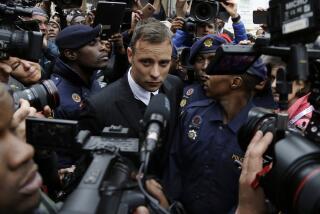South Africa to Keep Black Leader Jailed
- Share via
JOHANNESBURG, South Africa — President Pieter W. Botha said Thursday that the refusal of jailed black nationalist leader Nelson Mandela to reject violence in the struggle against South Africa’s apartheid system of racial segregation means that he will not be freed under the new amnesty for political prisoners here.
Mandela’s “continued imprisonment must, as of now, be attributed to (his) refusal to renounce a commitment to violence,” Botha said in Cape Town, reacting to a weekend statement by Mandela from his prison cell that he could not accept the government’s terms for his freedom.
“We cannot order the release (of Mandela and other political prisoners) if they remain committed to violence, sabotage and terrorism,” Botha said.
Four of the 15 long-term political prisoners eligible for the amnesty, however, have accepted the government’s conditions, Botha announced, and he has approved their release. The four, who have not yet been publicly identified, will be freed shortly, a prison spokesman said. All have served at least 20 years in prison on political charges.
Mandela Listed Terms
Mandela, in his statement, set his own conditions for accepting the government’s offer of release. They include legalization of the outlawed African National Congress, which he once led; freedom for political prisoners and exiles; full political rights for blacks, and a commitment to end apartheid. These have all been rejected by Cabinet members and other government spokesmen as “premature without a commitment to give up violence.”
The standoff means not only that Mandela, 66, will remain in prison, serving a life sentence imposed in 1964 for treason, but that hope diminishes for talks between the white minority regime and the African National Congress.
Calls for Mandela’s unconditional release were intended to “give lawlessness and crime a cloak of respectability and to make them into an acceptable means to achieve a political goal,” Deputy Foreign Minister Louis Nel said Thursday in Cape Town.
“This is an effort to change a terrorist organization into a partner in dialogue with the government,” Nel said. “The government will not be a partner to these efforts, though it is always willing to engage in dialogue with people who take a stand against violence.”
‘Slammed the Door’
A commentator on the government radio network was even tougher, saying: “Nelson Mandela has, for the present, cut himself off from those seeking a lasting peaceful solution for South Africa’s problems. He slammed the door shut himself, and in doing so has also excluded possible negotiations with the African National Congress. . . .
“The gap remains unbridgeable--the gap between the reasonable attitude of the South African government, as set forth by the state president, and the hostility of an embittered group blinded to anything else but their fruitless armed struggle and stereotyped propaganda.”
Mandela’s position and that of Oliver Tambo, his former law partner and successor as president of the African National Congress now in exile, was that they were being asked to forswear violence while the regime here made no matching concessions on the grievances that led the group to begin guerrilla warfare 25 years ago.
South Africa’s response to the declarations by the African National Congress leaders that they will continue the armed struggle was that even tougher measures will be taken against the organization.
More to Read
Sign up for Essential California
The most important California stories and recommendations in your inbox every morning.
You may occasionally receive promotional content from the Los Angeles Times.












